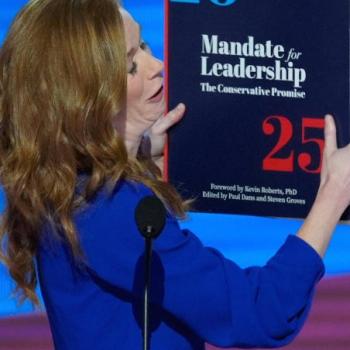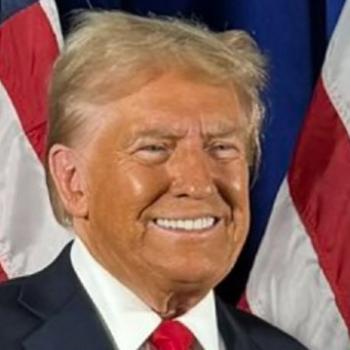Knight-Ridder's Ron Hutcheson talks with a series of observers inside and outside the Bush White House who support the argument I offered below in the post "Blair & Bush: The Difference":
Accounts from insiders in the Bush White House describe a tightly controlled, top-down organization that pushes a predetermined agenda, shuns dissenting views and discourages open debate.
Tell-all books from former Bush counterterrorism chief Richard Clarke and former Treasury Secretary Paul O'Neill, as well as accounts from other administration insiders, shed light on President Bush's decision-making style.
Paul O'Neill says meaningful discussion in the cabinet was shut out.Critics say the flip side of the legendary discipline at the Bush White House is a near-complete disregard for alternative opinions that sometimes leads to trouble.
In Clarke's view, Bush's reliance on a small circle of aides blinded the president to threats from al-Qaida and the negative consequences of invading Iraq. O'Neill said the tightly held decision-making process foreclosed meaningful discussion about the effect of the bigger federal deficits that resulted from Bush's tax cuts.
Their complaints about the lack of robust internal debate echo conclusions of some presidential scholars who study White House decision-making.
"George Bush tends to make decisions on the basis of hunch and intuition, and then pulls together groups that confirm his decisions," said Paul Light, director of the Center for Public Service at the Brookings Institution, a center-left research center. "The only people who are invited to be on the team are people who agree with him." …
The emphasis on message management at the expense of open debate is at the root of other controversies within the Bush administration:
• Richard Foster, the top actuary for Medicare, said this month that he was ordered not to tell Congress that the cost of adding prescription-drug coverage to Medicare could be $100 billion or more higher than advertised. Foster said he was told he could be fired if he told legislators.
Foster told a congressional committee Wednesday that he believes the information clampdown originated at the White House. The Department of Health and Human Services is conducting an internal investigation.
• In February, a group of more than 60 scientists, including 20 Nobel laureates, accused the administration of "suppressing, distorting or manipulating the work done by scientists at federal agencies." Among other complaints, the scientists said administration officials tried to downplay evidence of global warming and airborne bacteria at pig farms, and disregarded dissenting views on Iraq's nuclear capabilities.
Matthew Yglesias also highlights the Medicare scandal in his American Prospect piece "Credibility Gap," in which he argues that "the Bush administration has perfected the art of being dishonest without lying."
Occasionally, Matt concedes, they do tell an "outright lie," as in the case of the Medicare scandal:
The administration learned the true cost of the bill, realized that the truth was politically inconvenient, and decided to cover it up and continue to feed the public and the Congress information it knew to be false. That is a lie.
Yet often they do something else, something more subtle:
On Iraq, the administration took a different tack. On the subject of links between al-Qaida and Saddam Hussein, for example, the White House operated largely by omission. True, but incomplete, statements were made, calculated to instill a belief in the public that the Iraqi government was a sponsor of the Ansar al-Islam terrorist organization when there was not, in fact, any evidence that this was true. This was a clever strategy, in its way. By why is leadership by deception any less worthy of condemnation for the fact that the deception was cleverly performed?
Jack Beatty, in The Atlantic Monthly, doesn't find anything particularly clever about the Bush administration's pattern of deception. His article "The Faith-Based Presidency" stumbles into some unfortunate psychobabbling toward the end, but this seems dead on:
So much of President Bush has to be taken on faith. His integrity, for example. You have to trust the evidence of things unseen to believe him, for the visible evidence indicates a disposition toward deceit. Iraq's weapons of mass destruction, the cost of his prescription-drug bill, the effect of his tax cuts on the deficit, the number of lines of stem cells available to scientists after his restrictions on research. You name it — from who hung the Mission Accomplished banner up behind him for his "victory" strut on the USS Abraham Lincoln to his claims that on September 11 he, not the Air Force Chief of Staff, was the one to order the military to highest alert — he's lied about it.
Alternatively, Bush could be seen as what Al Sharpton called "an unconscious liar." He asks us to accept his feelings about something as evidence of the something. In this view, he's not deceitful; he's innocent of the procedures of rationality — he can't think.
One other gripe with Beatty. He cites Hebrews 11:1 — "Now faith is the substance of things hoped for, the evidence of things not seen" — and repeatedly attributes this to St. Paul. It's possible that the unattributed epistle to the Hebrews was written by Paul, but it's doubtful. Paul's trademark salutations and benedictions are absent from this book, and scholars have noted the ways in which the emphases of Hebrews differ from the Pauline epistles.
That's why theologians refer to the author of Hebrews as "the author of Hebrews." Any more specific citation is purely speculative. (My favorite speculation is that the author is Priscilla, but that's another post.)
















